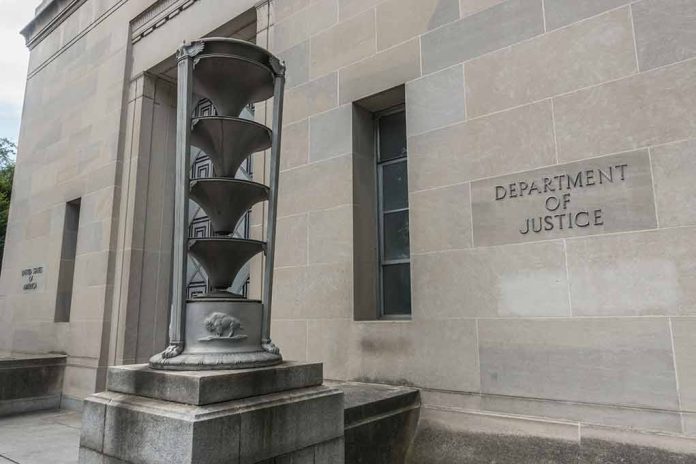
Attorney General Pam Bondi rescinds Biden-era protections for journalists, allowing prosecutors to once again seize reporters’ records in leak investigations as the Justice Department cracks down on unauthorized disclosures of sensitive information.
Key Takeaways
- The Justice Department has rescinded Biden-era policies that restricted prosecutors from accessing journalists’ records during leak investigations.
- Attorney General Bondi cited recent leaks of classified information to The New York Times as justification for the policy change.
- The new policy allows for subpoenas, court orders, and search warrants to obtain information from journalists with DOJ leadership approval.
- This marks a return to more aggressive approaches used during previous administrations to combat unauthorized disclosures.
- Press freedom advocates warn the change could have a chilling effect on important public interest reporting.
DOJ Shifts Policy on Press Protections
The Department of Justice under Attorney General Pam Bondi has officially reversed protections for journalists that were established during the Biden administration. The policy change, announced yesterday, removes restrictions that had limited prosecutors’ ability to seize reporters’ records during leak investigations. This significant shift restores the Justice Department’s authority to use subpoenas, court orders, and search warrants to obtain information and testimony from journalists when investigating unauthorized disclosures of classified or sensitive information. The move aligns with President Trump’s administration’s focus on cracking down on leaks that officials believe compromise national security interests.
The Biden-era policy, formalized in 2022, had been implemented after controversies during the previous Trump administration when the Justice Department secretly seized phone and email records of reporters from major news organizations. Those protections were designed to ensure press freedom and prevent unreasonable impairment of news gathering activities. Under the new guidelines, such investigative actions will require approval from DOJ leadership and must provide advance notice to journalists, with the Attorney General’s personal approval required for efforts to question or arrest members of the news media.
The Justice Department has rescinded a policy implemented during the Biden administration that restricted prosecutors from seizing reporters' records in criminal investigations, according to an internal memo obtained by ABC News. https://t.co/wVSJfDc6zi
— ABC News (@ABC) April 28, 2025
National Security Concerns Driving Policy Change
Attorney General Bondi justified the policy change by citing specific instances of leaks, including a recent case involving The New York Times reporting on classified intelligence. A criminal investigation has already been opened into this matter. Additionally, Homeland Security Secretary Kristi Noem and the FBI are actively pursuing charges against officials suspected of leaking details about deportation operations. These cases represent what the administration views as serious breaches of national security protocols that demand a more aggressive investigative approach.
“Federal government employees intentionally leaking sensitive information to the media undermines the ability of the Department of Justice to uphold the rule of law, protect civil rights, and keep America safe. This conduct is illegal and wrong, and it must stop,” Dondi said.
In her memo outlining the policy change, Bondi acknowledged the importance of press independence while also taking aim at “certain members of the legacy news media” whom she suggested lacked independence. The new policy directs the DOJ’s Office of Legal Policy to publish updated guidelines that will include procedural protections for obtaining information from media sources. These protections are described as “extraordinary measures” to be deployed only as a last resort when essential to successful investigations or prosecutions.
Implications for Press Freedom
The policy reversal has raised significant concerns among press freedom advocates who warn that the increased ability to investigate journalists could have a chilling effect on reporting. Critics point out that many landmark investigative reports that exposed government wrongdoing relied on confidential sources who might be deterred from coming forward under the new policy. The revival of these investigative tools represents a return to approaches used during both the Obama and previous Trump administrations, when journalists faced increased scrutiny in leak investigations.
“Some of the most consequential reporting in U.S. history — from Watergate to warrantless wiretapping after 9/11 — was and continues to be made possible because reporters have been able to protect the identities of confidential sources and uncover and report stories that matter to people across the political spectrum,” said Brown.
The policy shift comes amid heightened tensions between the administration and certain news organizations. Prior to his appointment as FBI director, Kash Patel had expressed intentions to target journalists reporting on Trump’s 2020 election loss. Meanwhile, critics have noted that the administration appears to be downplaying revelations about Trump officials allegedly sharing sensitive military details over encrypted apps, with Bondi indicating a criminal investigation into these matters is unlikely. This contrasting approach has led some observers to question whether the policy is being applied evenly or is targeted primarily at traditional media outlets.
Sources:
- Trump DOJ rescinds Biden-era protections for news media
- Justice Department revokes Biden-era protections for reporters in leak investigations : NPR






